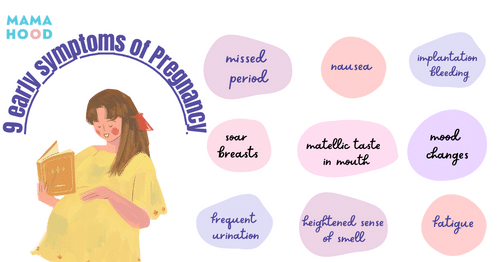9 Early Symptoms of Pregnancy
Is your period late by a few days, and do you have doubts about being pregnant? You might be suspecting the right thing! Some symptoms of pregnancy can be felt as early as four weeks of gestation (morning sickness in particular)
Early pregnancy can be detected through missed periods, nausea and vomiting, breast changes, tiredness, and frequent urination. However, it’s important to note that these symptoms may also be caused by stress or illness.
If you have a suspicion that you may be pregnant, it’s crucial to see your doctor for confirmation and appropriate care. Don’t hesitate to take control of your health and well-being.
Why am I experiencing the symptoms so soon?
As soon as the fertilized egg attaches itself to your uterus, your body starts producing hormones responsible for safeguarding the new life inside you. The predominant hormones of pregnancy are Human chorionic gonadotropin (Bhcg) and progesterone.
These hormones are responsible for making you tired and nauseous, but their values keep changing throughout pregnancy so that you won’t have the same troubling symptoms every trimester.

Missed Period in Early Pregnancy
If you have a regular menstrual cycle, the earliest sign you will notice is a missed period. If your menstrual cycle is irregular, then your missed period is not reliable. Perhaps your missed period results from an underlying hormonal issue or change in body weight.
In early pregnancy, changes in urine color can be a topic of concern for many expectant mothers. While it is important to remember that every woman’s experience is unique, there are some general observations regarding urine color during this stage.
Typically, urine color in early pregnancy remains within the normal range of pale yellow to amber, similar to the color of straw. This is primarily due to the increased blood flow and hormonal changes in the body.
However, it is crucial to note that urine color alone is not a reliable indicator of pregnancy. It is always recommended to consult with a healthcare professional for accurate and personalized guidance.
Nausea, vomiting, and fatigue
The research was conducted on 5079 women showing early pregnancy symptoms. The three leading symptoms were:
Fatigue in 44.4% of women
Nausea in 33.6% of women
Vomiting in 9.6% of women
Typically, nausea and vomiting begin at 5–8 weeks of gestation and peak at the 9th week. While fatigue increases throughout the pregnancy. Fatigue is directly related to progesterone, which is abundant in maintaining pregnancy.
Implantation bleeding
Another topic that often causes confusion among women in early pregnancy is distinguishing between implantation bleeding and a regular period. Implantation bleeding refers to light spotting or discharge that occurs when the fertilized egg attaches to the uterine lining. It generally takes place around 6-12 days after conception.
In contrast, a period is the shedding of the uterine lining when pregnancy has not occurred. It is important to recognize that implantation bleeding is usually much lighter and shorter in duration than a typical menstrual period.
If you experience any unusual bleeding or are unsure about the nature of your bleeding, it is advisable to consult with a healthcare professional to receive appropriate guidance and reassurance.
It looks like pink or brownish discharge from your vagina. It starts around the time of your regular period, but there is a disparity in features. Implantation bleeding is less in quantity, lasts for a day or two, and mostly there is no fresh blood in it.
Sore breasts
Your nipples may feel tender and sore to touch. The veins in your breasts could become more visible.
Metallic taste in the mouth
It’s one of the most reported symptoms in early pregnancy. It becomes more challenging for you to find joy in your favorite meals. You could lose interest in drinks like tea and coffee early in pregnancy. These aversions are only temporary; you will regain your sense of taste in a few weeks.
Mood Changes in Early Pregnancy
Mood swings are common in pregnancy. The hormonal changes are responsible for making you feel emotional. You might feel very happy, followed by feeling teary and sad. It’s because of the abrupt shift of hormones. Your body and mind will get the hang of it soon.
Frequent urination
As the pregnancy starts, there is an increase in the volume of your plasma (blood) which causes the kidneys to work more and produce more urine than normal.
Heightened sense of smell
You could be bothered by many smells now that it’s your early pregnancy. It might be hard for you to cook food without throwing up. Pregnancy hormones are to be blamed for this escalated sense of smell.
Fatigue
Don’t be surprised if you start feeling exhausted in early pregnancy, even before you realize you’re pregnant. Fatigue can kick in as early as one week after conception. Hormone levels are to blame, specifically the rise in progesterone. It’s a common experience, so don’t fret!
When to take a pregnancy test?
A strip test can detect Bhcg in urine after one week of your missed period. Sometimes the hormonal values are not high enough; you won’t get a positive result within a week of your missed period. In this case, you should wait for another week before repeating the test.
Bhcg levels in the blood are the most accurate way to detect a pregnancy. It can show positive results as early as four weeks of gestation. More often than not, a blood test is not required to confirm a pregnancy.
An insight from Mamahood
As you have probably heard, all pregnancies are different. Some women have intense symptoms in early pregnancy, while others do not feel a thing.
Statistically, about 85% of women experience some pregnancy symptoms before eight weeks of gestation.
If the symptoms mentioned above persist for a long time, they may diminish your quality of life by making you emotionally and physically vulnerable. So, if you suspect a pregnancy, it’s better to get the confirmation soon so you can plan your antenatal checkup with your healthcare provider.








